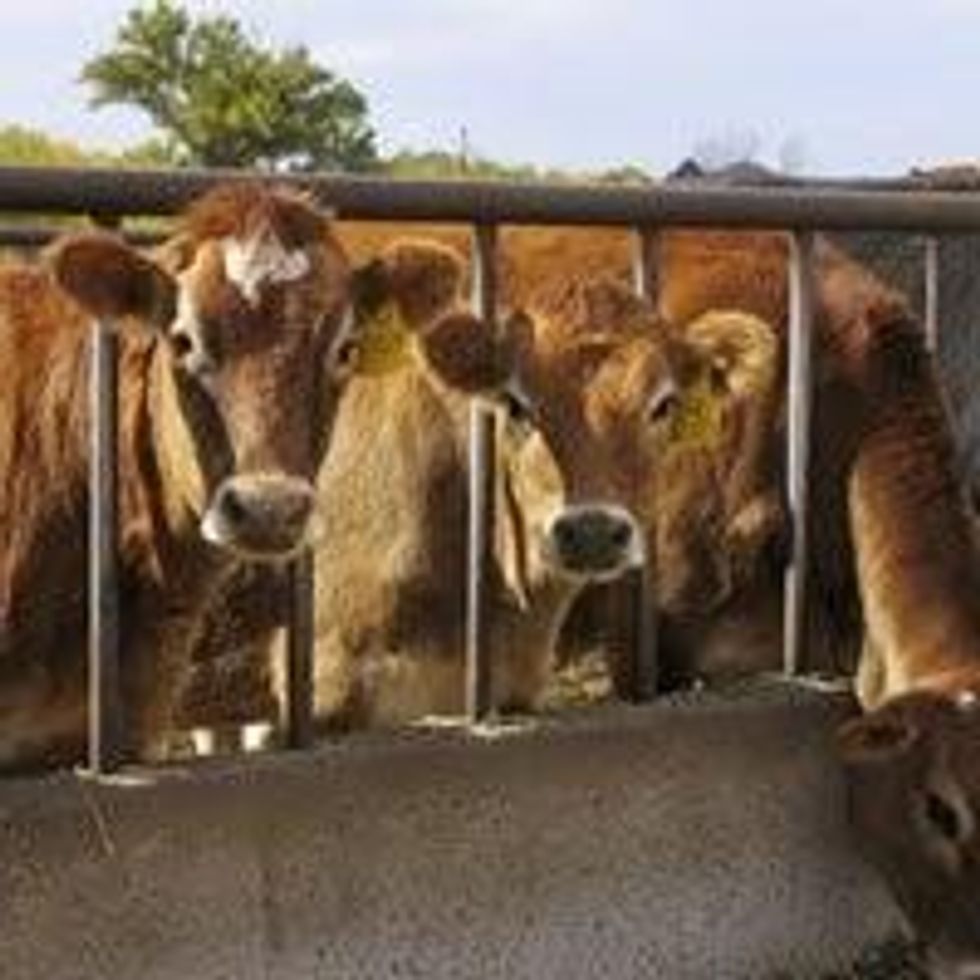A few months ago, the N
ew York TimesMagazine ran a
glowing cover profile of designer Stella McCartney. The piece was principally focused on how down-to-earth Stella is and how incredibly hard she works. But the part that most interested me, as an animal protection advocate, was the sympathetic coverage of Stella's animal rights activism--and that this
uber-successful fashion designer refuses to use leather.
As Stella explained, in one of the article's highlighted quotes, "Using leather to make a handbag is cruel. But it's also not modern; you're not pushing innovation."
I suspect that this comment took many readers by surprise. Most people never think about the fact that leather is horrible for the environment and even worse for tannery workers, nearby communities, and animals. I was reminded of Joe Wilson and Valerie Plame's appearance on Real Time with Bill Maher when the couple was promoting Plame's book, Fair Game: My Life as a Spy, My Betrayal by the White House.
During that segment, Bill gave Wilson a hard time for coming on his show with a cow corpse on his back (Maher is consistently vocal about his support for animal rights and often references his association with PETA). For someone who was so totally supportive of Wilson and Plame, it was an interesting decision--to point out to his guest, for whom he clearly had tremendous respect, that wearing leather supports egregious cruelty to animals.
I suspect that Maher felt like I did when I wrote to Katrina vanden Heuvel, editor of The Nation magazine, about the leather jacket she wore in her appearance on the Colbert Report. As a Nation reader of more than 25 years, Katrina is a hero of mine. I know that she would never slice a cow's throat open for a fashion accessory, so I don't understand how she justifies paying people in the third world to do it for her. I know she wouldn't personally poison workers in the developing world and pollute their communities with toxic chemicals, so I don't understand how she can look the other way as precisely that happens. I'm still wondering.
At Farm Sanctuary, we've been providing lifelong care to cows and other farm animals for more than a quarter century, and we can tell you from experience that cows are interesting individuals, just like dogs and cats. They have varied and distinct personalities. They form loving bonds. They can be playful (or standoffish). We see every day that they have the same qualities as those animals who millions of people welcome into their homes.
Science validates our own experiences. Cows interact with one another in complex ways, forming collaborative relationships (for example, they form "grooming partnerships," just like chimpanzees), learning from one another, and making decisions based on altruism and compassion. Sunday Times science editor Jonathan Leake explains that "cows have a secret mental life in which they bear grudges, nurture friendships and become excited over intellectual challenges," just like humans. There's more, which we've distilled on the "Someone, Not Something" pages of our Web site (our point: that each farm animal is an individual, is "someone, not something").
Jane Goodall explains that "farm animals feel pleasure and sadness, excitement and resentment, depression, fear, and pain. They are far more aware and intelligent than we ever imagined...they are individuals in their own right." At Farm Sanctuary, we would no more kill and wear cows than we would kill and wear kittens or puppies.
And sadly, cows don't just die for leather; they're also abused in ways that would be illegal of dogs or cats were the victims: Their bodies are mutilated without pain relief, they're fed a diet that keeps them in chronic pain, they're trucked for days at a time through all weather extremes, and more. And that's what happens in the U.S. In China and the developing world, where most animal skins originate, abuse of cows is beyond our worst nightmares (please see the video below). And remember, even if a leather garment is made in the U.S. or Europe--and even if it's expensive--the actual leather is probably still cheap leather from China or the developing world.
Leather is also horrid for workers and the environment, which is the reason I stopped wearing it 25 years ago. To stop a cows' corpse from decomposing, it has to be treated with highly toxic chemicals--turning it into something that defies nature: an animals' corpse that will never rot.
Those chemicals are horrible for the environment, for the workers in the tanneries, and for the populations that live downstream. In New Scientist magazine, a lawyer for China's Centre for Legal Assistance to Pollution Victims describes conditions on one river poisoned by waste from a nearby tannery: "A few years ago, villagers could swim in the river. Now they get blisters on their hands and feet from touching the water. ... When you stand close to the river you can smell rotting flesh because the leather factory dumps its sewage, made up of animal skin and meat, untreated into the river." Is a leather jacket, belt or pair of shoes really worth that?
This PETA investigation video, narrated by Pamela Anderson, shows what animals and workers suffer for leather:
Every time we choose what we're going to wear, we make a statement about who we are in the world: Progressive values involve taking the side of the weak against the strong, but wearing dead animals does the opposite of that. Leather supports cruelty and the poisoning of workers and communities; progressives shouldn't be a part of it.

